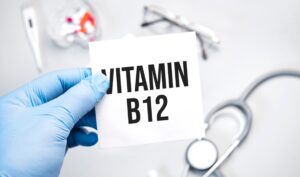Health Benefits of Vitamin B12
 Vitamin B12, also known as cobalamin, is an essential nutrient that plays a vital role in many bodily functions. From aiding in the formation of red blood cells to supporting brain health, Vitamin B12 is a powerhouse nutrient that you don’t want to overlook. In this post, we’ll take a look at the science-backed health benefits of Vitamin B12. To check your vitamin B12 level in the Tampa Bay area, contact the office of Dr. Kavita Rao, St. Petersburg’s premier internist.
Vitamin B12, also known as cobalamin, is an essential nutrient that plays a vital role in many bodily functions. From aiding in the formation of red blood cells to supporting brain health, Vitamin B12 is a powerhouse nutrient that you don’t want to overlook. In this post, we’ll take a look at the science-backed health benefits of Vitamin B12. To check your vitamin B12 level in the Tampa Bay area, contact the office of Dr. Kavita Rao, St. Petersburg’s premier internist.
Benefits of Vitamin B12
Metabolic Processes
Vitamin B12 is crucial for various metabolic processes in the body. It helps in the conversion of food into energy, thus playing a significant role in combating fatigue and lethargy. Experts agree that adequate levels of Vitamin B12 could improve energy metabolism and reduce feelings of tiredness.
Cognitive Function
Research has shown that Vitamin B12 can have a positive impact on cognitive function. It is essential for maintaining the health of nerve cells and aids in the production of DNA and RNA. Vitamin B12 supplementation could be beneficial in preventing cognitive decline in older adults.
Anemia Prevention
Vitamin B12 is vital for the production of red blood cells. A deficiency in this nutrient can lead to anemia, a condition characterized by a lack of healthy red blood cells. Research suggests that Vitamin B12 supplementation could effectively treat anemia and improve the quality of life for those suffering from this condition.
Cardiovascular Health
Vitamin B12 works in tandem with other B vitamins like folic acid to help regulate homocysteine levels in the blood, which is crucial for cardiovascular health. Elevated levels of homocysteine are associated with an increased risk of heart disease.
Recommended Dietary Intake of Vitamin B12
The recommended dietary allowance (RDA) for Vitamin B12 varies by age, as shown below:
- Birth to 6 months* – 0.4 mcg
- 7–12 months* – 0.5 mcg
- 1–3 years – 0.9 mcg
- 4–8 years – 1.2 mcg
- 9–13 years – 1.8 mcg
- 14–18 years – 2.4 mcg
- 19+ years – 2.4 mcg
- During Pregnancy – 2.6 mcg
- While Lactating – 2.8 mcg
Sources of Vitamin B12
Good food sources of Vitamin B12 include:
- Meat
- Eggs
- Fish
- Dairy
- Fortified cereals
- Fortified nutritional yeasts
Potential Side Effects
While Vitamin B12 is generally considered safe, excessive intake from supplements can lead to potential side effects like headaches, nausea, and dizziness. Always consult your healthcare provider before starting any new supplement regimen.
Schedule a Wellness Check
Vitamin B12 is just one piece of the puzzle to unlocking optimal health. If you’re in the Tampa Bay area and are interested in learning more about your Vitamin B12 levels, schedule a general wellness check with Dr. Kavita Rao, Gulf Coast Internist, by calling 727-525-0900 or contacting us online.

